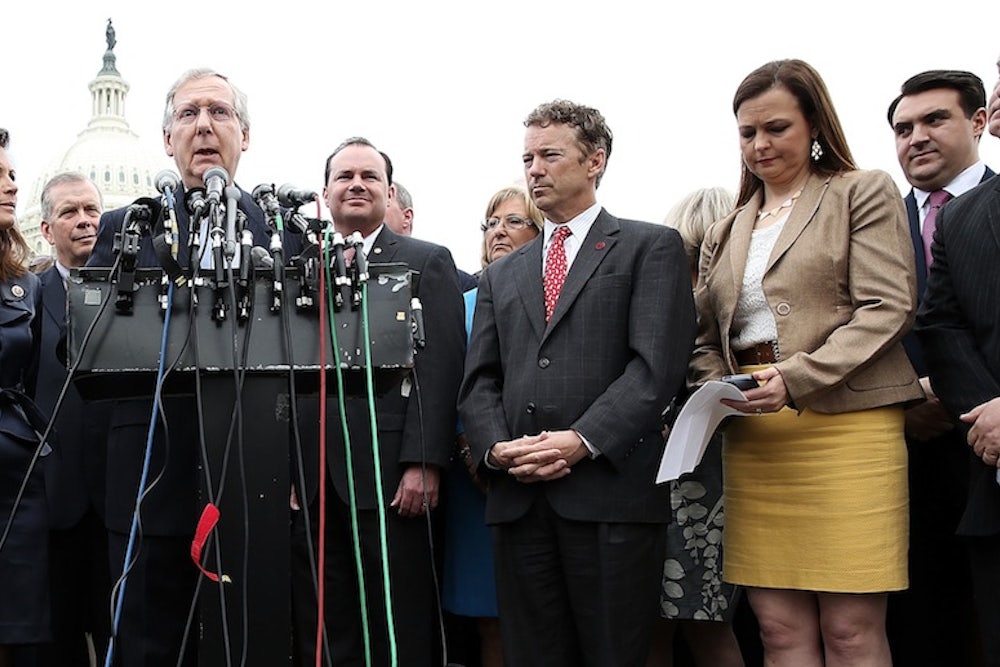I'm pretty confident that if President Barack Obama could reverse one thing about his presidency it would be the Republican wave in 2010. It stalled his agenda, it empowered the right, it prefigured damaging budget fights, it turned a bunch of states into right wing laboratories and allowed Republicans to gerrymander themselves into control of the House for many cycles in a row.
The stakes were very large and he and Democrats were not well prepared.
Relative to a political disaster of that scale, I agree with Hoover Institution fellow Tod Lindberg, who argued on The New Republic website Wednesday that the 2014 midterms won't be particularly meaningful, even if Republicans capture the Senate. Obama surely doesn't want that to happen, but he could absorb the consequences of it much easier than he was able to absorb the consequences of the 2010 election.
But I believe he underplays the likelihood of important consequences in two key ways—both with respect to the harm it would do to Democrats, and with the challenge it would pose to Republicans.
Let's take those in reverse order, because the dynamic that a GOP Senate takeover would create on the right is more complex and interesting than the straightforward disadvantage defeat would impose upon Democrats.
There is an existing tension between conservative rank and file Republicans and Republican party leadership—between those who insist on maximizing the GOP's existing power as a Congressional party, and those who prefer to eschew politically unsupportable exercises of power for the sake of the party's national standing. A GOP victory in November would encourage both factions to pull harder in opposing directions.
I made a similar argument here two months ago, and the basic shape of it still holds. "With respect to just about every potential partisan conflict…the tensions already simmering within the party will come boiling to the surface. And Republican leaders won't be able to satisfy their restive members with the familiar, mathematically questionable excuse that they only control one-half of one-third of government."
Republican hardliners in Congress and their enablers on the grassroots right will expect a Senate takeover to translate into the kinds of results they've been denied thus far. No more blinking in budget showdowns. No more balking at the prospect of confrontation.
But by the time those fights roll around, the presidential contest will be in full swing, and to the extent that mollifying the base would be politically damaging to the Republican party nationally, Congressional leaders will be more reluctant than they are now to do so. If GOP voters nominate a member of the Senate or House, that person will be linked to the Congressional party and all of its hijinx. If they nominate a governor or a former governor, that person will feel tremendous pressure to draw contrasts and divide the party ahead of the election. Those are both outcomes Majority Leader Mitch McConnell would like to avoid.
I'm not sure how Republicans would ultimately resolve the tension, but I'm quite confident that the hardline faction will demand confrontation with the White House over Obamacare and greenhouse gas regulations; that they will insist upon using must-pass measures like the debt limit and appropriations bills as vehicles for those fights; that they will try to deny Obama nominees (including, perhaps, a Supreme Court nominee or two) confirmation; and that they will be somewhat more excited about the prospects of impeachment than they are today.
Obama can counter each these impulses with a veto pen, the bully pulpit, and a determined minority party in Congress, respectively, which is why I think Lindberg's ultimately correct about the substantive consequences of a Republican Senate takeover. (This is especially true if Democrats manage to fill as many judicial and executive branch vacancies as possible between now and January.) But if any of the GOP's internal tensions give rise to a maximalist confrontation with Obama it would be a huge stain on the party ahead of the presidential election. In that sense a Senate majority would present the party with a crucial test—a staging ground upon which they'd be expected to behave like a governing party. And to succeed they'd have to overcome the impulse to behave like the opposition.
The flip side, of course, is that Republicans would gain agenda setting power. If they were disciplined with this new power, they would splinter the Democratic minority and force Obama to veto popular legislation—something he and Hillary Clinton and everyone else in the Democratic party have every interest in avoiding. This would be a bigger concern if Republicans were lying in wait with a popular agenda. As Lindberg notes, it "assumes a GOP-dominated legislative process is, in fact, capable of producing popular legislation." And there are a lot of reasons to doubt that. But just because the coming two years will probably be marked by gridlock doesn't mean they won't be explosive and consequential in their own ways.
